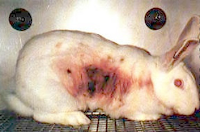I’m not really one
for clubs and cliques, but when I was 14, I was so upset I joined the Anti-Vivisection Society.
I was already distressed
by the casual way people ate animals. But did we have to maim, torture and
kill them in the name of scientific research?
The aims of the
Anti-Vivisection Society are clear enough: to show how flawed the ‘science’ of
animal testing is, in order to prevent the pointless suffering of animals - in
that order. Back when it was formed in 1978, the thought that animals might
have rights even approaching the
rights of humans seemed ridiculous to most people, so there was no point going
on about animal suffering. (Fast-forward four decades though, and the ‘rights
of personhood’, in groundbreaking legislation, are granted to the great apes).
Back in the
70s more leverage was to be gained by focusing on what vivisection didn’t do rather than what it did. And
what it doesn’t do, despite what it says on the tin, is give any assurance that
results from tests on animals mean anything for humans.
There is no
guarantee that a result observed from a test on a rat, a rabbit, or a beagle has relevance for us.
LD50 tests, responses to medication and
reactions to diseases. All these tests are performed on animals in captivity,
here in New Zealand as elsewhere. But why? Most modern day animal testing is performed for the legal protection of industry, not for purposes of scientific
research.
 |
| Skin irritancy testing. Photo credit: Unleashed |
The theory of Utilitarianism says that the best solution is one that provides the greatest good for
the greatest number. But is this only the greatest number of people?
The preservation
of our modern lifestyles – if not our species - will depend on what we do now to
ensure the greatest good for the greatest number of creatures, of plant species, of ecosystems.
A question for you, put to me many
times over the years by irritated relatives, teachers and workmates: don’t you
think that the suffering of people is more important than the suffering of
animals? If your child was suffering
from, say, cystic fibrosis, wouldn’t you
want scientists to do everything they could to find a cure? Would you think it
was okay, then, for experiments to be done on animals?
If you said yes,
consider this. What animal is closely related enough to your child to be a valid
test subject, really? The perfect match is another child. Would you think it
was okay for researchers to experiment on someone else’s kids to find a cure
for yours?




